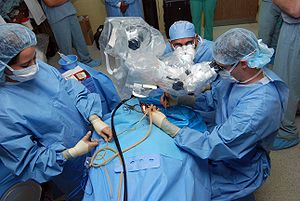
- Image via Wikipedia
The topic of ehealth is attracting huge interest in Brussels amongst policymakers, stakeholders, think tanks…. Basically our Brussels’ bubble.
First of all – what is it? A good definition seems “the application of information and communications technologies in the health sector”.
Secondly, will it transform European healthcare system in the long term? In a two pager, posted on our FH website, we have tried to outline its benefits and the barriers that have still to be overcome if we want ehealth to flourish.
Enjoy!
Teresa
4 Comments
Find Out More
-
Generative AI is changing the search game
May 8, 2025
-
The challenges facing Europe and European leaders at Davos 2025
January 24, 2025
![Reblog this post [with Zemanta]](http://img.zemanta.com/reblog_e.png?x-id=f2ca2a21-c2e4-4a2a-82f1-dc68fdabe04e)



April 21, 2010 | 11:19 AM
I agree with the concept of e-health but am dismayed (and angry) that there is so little control exercised over the ridiculous amount of our (taxpayers) money that has been squandered with little regard for value received.
March 11, 2010 | 6:47 PM
Broadband deployment has at least become a focal item on the EU agenda (see EU2020 strategy / Digital agenda). Eskills however have strangely enough not been highlighted yet. This is quite odd given that studies estimate up to 400,000 skilled labour lagging in the years until 2015 - making it difficult for business and industry to remain competitive and actually make use of the technology that would be available to them. Europe can either decide to loosen the barriers for qualified labour migration or finally get their act together and put stronger emphasis on training and education.
March 11, 2010 | 6:27 PM
Peter - I am glad you liked the paper and thanks for taking time to give your comments. I agree - eskills is definitely a barrier and actually broadband deployment is another one (how to expect ehealth to flourish if internet is lacking in a rural area?). We have listed some of the barriers and we'll discover more...
March 11, 2010 | 3:18 PM
Teresa, thanks for this interesting analysis. However, there's one important barrier missing in your list, namely the lack of eskills. Citizen's will only be able to make use of the new possibilities offered by eHealth applications if they understand the basic principles of how to use a computer and the Internet. The European eSkills Association (the fmr. eSkills Industry Leadership Board) has been advocating for years stronger commitment of policy makers to invest in eskills education and training, both at school but equally important as part of the life-long learning process. In it's recently published policy statement EeSA makes five very concrete recommendations to better integrate eskills in our everyday life: 1. Foster synergies amongst educational institutes, ICT industry, IT professionals in the private and public sector to promote e-skills and training 2. Increase attractiveness of ICT as a career path 3. Foster ICT professionalism 4. Align the supply of e-Skills training and qualifications with demand 5. Drive uptake of e-skills in business, especially in SMEs